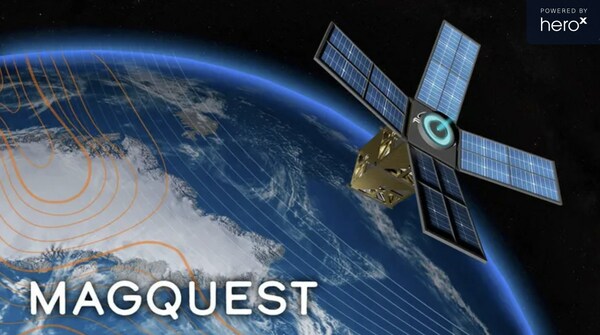Millions awarded to help accelerate novel approaches to geomagnetic data collection for the World Magnetic Model
The National Geospatial-Intelligence Agency announced the results of the Demonstration Phase (Phase 4a) of MagQuest to develop novel data collection approaches for the World Magnetic Model. The challenge was conducted on NASA's HeroX platform, and all three teams who participated in Phase 4a have successfully constructed magnetometers and tested them at NASA's renowned Goddard Space Flight Center. These teams, who have been awarded millions in funding, will now advance to design, build and launch a satellite to take their magnetometers into orbit and collect data on the earth's magnetic field. The ultimate goal is for the government to buy magnetic field data from one or more of the participating teams.

Millions awarded to help accelerate novel approaches to geomagnetic data collection for the World Magnetic Model
"We are thrilled to celebrate the success of the MagQuest Teams, whose remarkable solutions have showcased the potential of these innovative magnetometers," said Mike Paniccia, NGA's program manager for the World Magnetic Model. "MagQuest has been a journey of innovation, collaboration, and boundary-pushing, and we are excited to see how these solutions shape the future of geomagnetic data collection."
The three teams who successfully demonstrated their magnetometers are:
- Iota Technology, who works alongside experienced teams from Twin Leaf, Oxford Space Systems and AAC Clyde Space. Their combined expertise in sensor technology, deployable structures, and mission design informed the design of their SIGMA solution – a 3U CubeSat featuring a novel deployable boom and a 3D magnetometer array.
- University of Colorado Boulder, and their solution, COSMO, leverages recent innovations in CubeSat technology and novel magnetometer technology. The University of Colorado Boulder team includes experts and faculty from the Department of Aerospace Engineering Sciences, the Department of Mechanical Engineering, Field Line Inc., and the Laboratory for Atmospheric and Space Physics.
- Spire Global and SBQuantum joined forces and formed a partnership with a promising approach. SBQuantum's novel diamond-based quantum magnetometer technology is coupled with Spire's expertise and existing infrastructure in satellites, ground stations, and data processing to produce a unique solution.
MagQuest is driving innovation in geomagnetic data collection to fuel the World Magnetic Model. The WMM ensures the accuracy of navigation because it corrects for differences in magnetic forces at a user's location. The model is used by thousands of systems for mobile navigation apps and is critical for military and commercial uses around the world. The current WMM relies on data from an aging satellite system and the types of technologies demonstrated in MagQuest aim to replace this outdated system.
"MagQuest's pursuit of cutting-edge technologies to capture Earth's magnetic field data showcases the power of global collaboration available through crowdsourcing," said Kal K. Sahota, CEO, HeroX. "We are excited for the progress these innovators will make as they vie to design, build, and launch their satellites to take their magnetometers into orbit."
To view the award, visit www.herox.com/MagQuest.
Media Contact:
Alexandra Pony
250.858.0656
SOURCE HeroX
